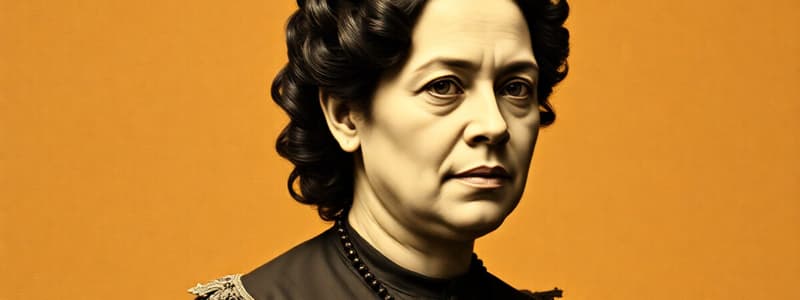Podcast
Questions and Answers
What groups of people were often considered unworthy of the vote according to the suffragists?
What groups of people were often considered unworthy of the vote according to the suffragists?
- Educated white men
- Only Native Americans and Latino Americans
- Wealthy immigrants
- People who couldn't read or write, Native Americans, African Americans, and immigrants (correct)
Which leader expressed a desire to retreat to a place with 'some American people left'?
Which leader expressed a desire to retreat to a place with 'some American people left'?
- Alice Paul (correct)
- Elizabeth Cady Stanton
- Susan B. Anthony
- Mary Ann Shadd Cary
What was a significant criticism of the suffragists' approach to gaining support for suffrage?
What was a significant criticism of the suffragists' approach to gaining support for suffrage?
- They limited their advocacy only to educated women.
- They neglected the needs of immigrant communities entirely.
- They often catered to racist beliefs in their efforts for suffrage. (correct)
- They relied solely on political alliances with progressive parties.
How did Elizabeth Cady Stanton describe the knowledge of certain individuals in relation to governance?
How did Elizabeth Cady Stanton describe the knowledge of certain individuals in relation to governance?
What does the imagery on page 2 symbolize regarding the responsibilities of colored women?
What does the imagery on page 2 symbolize regarding the responsibilities of colored women?
What significant impact did Mary Ann Shadd Cary have on public perception during her time?
What significant impact did Mary Ann Shadd Cary have on public perception during her time?
Why did Mary Ann Shadd Cary's family move to Pennsylvania?
Why did Mary Ann Shadd Cary's family move to Pennsylvania?
What was the Fugitive Slave Act of 1850, which concerned Mary Ann Shadd Cary?
What was the Fugitive Slave Act of 1850, which concerned Mary Ann Shadd Cary?
What was Mary Ann Shadd Cary's suggestion for improving the lives of black people?
What was Mary Ann Shadd Cary's suggestion for improving the lives of black people?
How did Mary Ann Shadd Cary contribute to the education of black children?
How did Mary Ann Shadd Cary contribute to the education of black children?
What role did her family's home play in the fight against slavery?
What role did her family's home play in the fight against slavery?
What was a notable quality of Mary Ann Shadd Cary that influenced others around her?
What was a notable quality of Mary Ann Shadd Cary that influenced others around her?
What societal issue motivated Mary Ann Shadd Cary's father to take an active role in community efforts?
What societal issue motivated Mary Ann Shadd Cary's father to take an active role in community efforts?
Which of the following arguments did Mary Ann Cary NOT make to support the idea that black women should have the right to vote?
Which of the following arguments did Mary Ann Cary NOT make to support the idea that black women should have the right to vote?
How did Mary Ann Cary's approach to suffrage differ from some of her white suffragist counterparts?
How did Mary Ann Cary's approach to suffrage differ from some of her white suffragist counterparts?
What was Mary Ann Cary's response when workers refused to register her and other women to vote in 1874?
What was Mary Ann Cary's response when workers refused to register her and other women to vote in 1874?
Why did Mary Ann Cary believe that black women should have the right to vote, and what did she argue would be the consequences of their disenfranchisement?
Why did Mary Ann Cary believe that black women should have the right to vote, and what did she argue would be the consequences of their disenfranchisement?
What societal barriers did Mary Ann Cary face in her fight for suffrage?
What societal barriers did Mary Ann Cary face in her fight for suffrage?
In Mary Ann Cary's view, what was the impact of the lack of suffrage on black women's lives?
In Mary Ann Cary's view, what was the impact of the lack of suffrage on black women's lives?
Frances Willard, a prominent temperance reformer and suffragist, held an insulting view of African Americans. Her words reveal what about the complexities of the suffrage movement?
Frances Willard, a prominent temperance reformer and suffragist, held an insulting view of African Americans. Her words reveal what about the complexities of the suffrage movement?
How did Mary Ann Cary's experiences as a pioneer in the African American press shape her views on suffrage?
How did Mary Ann Cary's experiences as a pioneer in the African American press shape her views on suffrage?
Flashcards
Disenfranchisement of Whole Classes
Disenfranchisement of Whole Classes
The idea that certain groups of people, including immigrants, African Americans, and those who couldn't read or write, were deemed unfit to vote.
Exploiting Racism for Suffrage
Exploiting Racism for Suffrage
The practice of using racist beliefs to gain support for women's suffrage, even if it meant excluding other marginalized groups.
Mary Ann Shadd Cary's Contribution
Mary Ann Shadd Cary's Contribution
Mary Ann Shadd Cary, an activist, journalist, and educator, made a significant contribution to the fight for both women's rights and African American rights.
Shared Responsibilities of Freedom
Shared Responsibilities of Freedom
Signup and view all the flashcards
Struggle for Suffrage and Exclusion
Struggle for Suffrage and Exclusion
Signup and view all the flashcards
Mary Ann Shadd Cary
Mary Ann Shadd Cary
Signup and view all the flashcards
The Provincial Freeman
The Provincial Freeman
Signup and view all the flashcards
Black women's leadership
Black women's leadership
Signup and view all the flashcards
Mary Ann Shadd Cary's view on suffrage
Mary Ann Shadd Cary's view on suffrage
Signup and view all the flashcards
Prejudice against Mary Ann Shadd Cary
Prejudice against Mary Ann Shadd Cary
Signup and view all the flashcards
Mary Ann Shadd Cary's belief in the vote
Mary Ann Shadd Cary's belief in the vote
Signup and view all the flashcards
Mary Ann Shadd Cary's advocacy for Black women
Mary Ann Shadd Cary's advocacy for Black women
Signup and view all the flashcards
Mary Ann Shadd Cary's political strategy
Mary Ann Shadd Cary's political strategy
Signup and view all the flashcards
Mary Ann Shadd Cary's Early Life
Mary Ann Shadd Cary's Early Life
Signup and view all the flashcards
Moving to Pennsylvania for Education
Moving to Pennsylvania for Education
Signup and view all the flashcards
The Shadd Cary Home as a Refuge
The Shadd Cary Home as a Refuge
Signup and view all the flashcards
Returning to Delaware as a Teacher
Returning to Delaware as a Teacher
Signup and view all the flashcards
Mary Ann's Passion for Change
Mary Ann's Passion for Change
Signup and view all the flashcards
The Fugitive Slave Act and its Consequences
The Fugitive Slave Act and its Consequences
Signup and view all the flashcards
Mary Ann's Vision of Canada
Mary Ann's Vision of Canada
Signup and view all the flashcards
Mary Ann Shadd Cary's Legacy
Mary Ann Shadd Cary's Legacy
Signup and view all the flashcards
Study Notes
Mary Ann Shadd Cary
- Mary Ann Shadd Cary was a prominent abolitionist, activist, and writer
- She was born in 1823 and died in 1893
- She observed her actions impacted others, including a trolley driver
- She was a child of freed slaves, one of 13 children
- She and her family moved from Delaware to Pennsylvania to escape policies that targeted the black population
- The family moved to Quaker country because existing policies prevented children from being educated
- She advocated for black people to have the right to reside wherever they desired
- At age ten, she attended a Quaker school and lived on a farm in a free black community
- She was influential in the early movements toward black education and equality
Cary's Activism and Education
- After teaching in multiple states, she became impatient with the lack of progress for black people
- She wrote a letter to Frederick Douglass that was published in his newspaper
- She also organized the first African-American newspaper in North America called The Provincial Freeman
- She was the second African American woman to earn a law degree from Howard University Law School
- She was instrumental in black rights and women's rights movements
- She worked towards enabling black people to register and vote during this period
- She fought prejudice towards African Americans and women in voting rights movements
- She advocated for black rights and equality through writing and advocacy
- She was connected to the Underground Railroad as part of her work in the black rights movement
Cary's Personal Life
- She married Thomas Cary, had children, and worked tirelessly for racial uplift
- She actively fought for the right of black people to work and live in America
- She was well respected, evidenced by the donations she received for her work
- She actively participated in supporting black rights during the Civil War
- She worked with prominent suffragettes such as Susan B. Anthony and Elizabeth Cady Stanton
- She advocated for the right of black women to vote
Studying That Suits You
Use AI to generate personalized quizzes and flashcards to suit your learning preferences.




